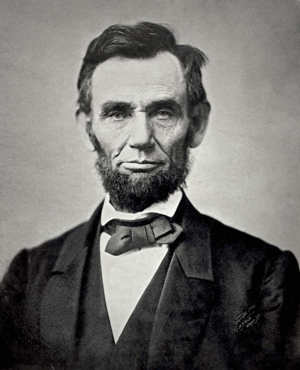 In 1861 Abraham Lincoln faced the greatest test of his presidency when he tried to hold together the United States in the face of a highly divisive Civil War that eventually claimed the lives of over 700,000 combatants in the North and South of the country.
In 1861 Abraham Lincoln faced the greatest test of his presidency when he tried to hold together the United States in the face of a highly divisive Civil War that eventually claimed the lives of over 700,000 combatants in the North and South of the country.
However, Lincoln was a lucky man. And he had at his disposal a new weapon. A weapon more powerful than a Smith & Weston.
It was the telegraph.
Before the invention of the telegraph it would take a dispatch rider the best part of a week to reach the battle front on horseback. Now Lincoln could now dispatch orders to his Army Generals by getting an operator to tap them instantly into the machine.
Although the telegram was regarded as revolutionary at the time, the perception of whether Lincoln was winning the war of words often trailed behind what was actually happening on the battlefields and Lincoln was often consumed by what Congress and other politicians thought of him.
He famously remarked: “Character is like a tree and reputation is like a shadow. The shadow is what we think of it; the tree is the real thing.”
Lincoln enjoyed the reputation of a being great military strategist although Steven Spielberg’s biopic told a different story: a man who struggled with his inner demons and was actually a shrewd tactician, brilliantly portrayed by Oscar-winning actor Daniel Day-Lewis.
Fast forward 150 years and perhaps if Lincoln were alive today he may have a change of heart about his own thoughts about reputation being like a shadow.
“Reputation can’t be divorced from reality in the digital world and even governments find it impossible to manage the flow of information that now travels around the world in seconds rather than minutes,” observed George Pascoe-Watson, partner of leading reputation management agency Portland, speaking at the recent meeting of the PRCA PR Council.
“Reputation is everything,” he said and who can argue with that?
Pascoe-Watson had spent a sizeable part of his career working for The Sun as its political editor and then walking the corridors of power at Westminster as a lobbyist. So perhaps he’s more qualified than most to understand how easy it is for the reputation of an organisation – or politician – to be destroyed by a careless remark or ill-fated policy initiative.
Pascoe-Watson now advises companies like Google about how best to manage reputation in a digital world. He also shared his thoughts about the ‘economics of reputation’ – a key 2014 PRCA PR Council initiative, and something that the PR industry recognises as being important but which is perhaps not that well understood.
According to Mark Lund, the newly appointed Group CEO at McCann Worldgroup, reputation – rather than public relations – is now what really counts for his clients.
“It’s getting harder to differentiate between one product or service and another. Reputation, on the other hand, can help a company secure the ‘licence to operate’ that it needs to do business in the first place.”
He added: “Reputation helps to build a strong consensus among customer segments as well as the wider community at large.”
“The cost for not getting this right is massive,” concluded Pascoe-Watson. He challenged the PR industry to do more in understanding the linear relationship between the financial performance of a company and the impact that a negative reputation can have on its bottom line. That is the true measure of the economics of reputation.
To find out more about the PR Council Economics of Reputation initiative and understand the real value of reputation to organisations, visit the PRCA website – and download the Economics of Reputation toolkit produced by Now in association with BNY Mellon.














[…] Was Abraham Lincoln right about the nature of reputation? […]